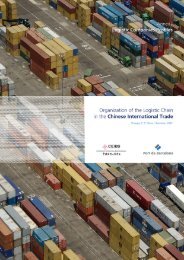Untitled - China Europe International Business School
Untitled - China Europe International Business School
Untitled - China Europe International Business School
You also want an ePaper? Increase the reach of your titles
YUMPU automatically turns print PDFs into web optimized ePapers that Google loves.
Organization of the logistic chain in the Chinese international trade<br />
Ports and Terminal operators<br />
The surge of <strong>China</strong>-<strong>Europe</strong> trade is resulting in an increasing volume of containerized cargo directed to<br />
<strong>Europe</strong>an ports. While Chinese ports are experiencing the fastest throughput growth in the world, they<br />
are able to increase their capacity at a similar pace and to achieve high terminal productivities. On the<br />
other hand, <strong>Europe</strong>an ports have to balance port development with environmental protection, deal with<br />
security issues, government changes, and labor availability and cost. Therefore <strong>Europe</strong>an ports<br />
capacity is being developed at an insufficient pace even if the flow of private investments within its<br />
scope is increasing and becoming also a key drive to improve efficiency within port operations.<br />
All the main players in the logistic chain manifest serious doubts about the capacity of <strong>Europe</strong>an ports<br />
and their hinterland networks to absorb the increase of containerized cargo from <strong>China</strong> forecasted for<br />
the next years without causing disruptions to the logistic chains.<br />
On the other hand, competition between <strong>Europe</strong>an ports is increasing. Attracting cargo volumes and<br />
cargo owners’ distribution centers, to maintain shipping lines calling, becoming first port of call, to<br />
achieve higher productivities in port operations (which is seen as a way to cut investments in<br />
infrastructure and to avoid overcapacity if demand slows down) are major concerns of <strong>Europe</strong>an Ports.<br />
Therefore Port Authorities in <strong>Europe</strong> are working towards building a network to compete for logistic<br />
chains, not for hinterlands anymore in order to secure cargo volumes in the hands of increasingly<br />
powerful shipping lines.<br />
Terminal operators have become global players, building a network of ports in order to improve their<br />
service to shippers and carriers as well as improving the integration of the terminals with the hinterland.<br />
CEIBS Port of Barcelona Chair of Logistics 60










